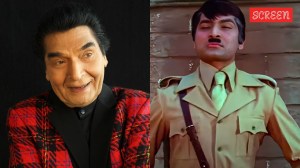He showed them what vote means, they are still paying him back
Jagdish Yadav has been campaigning as hard as he did 15 years ago, to get Laloo Yadav a fourth term in power—he knows well what it cost...

Jagdish Yadav has been campaigning as hard as he did 15 years ago, to get Laloo Yadav a fourth term in power—he knows well what it costs. He will wake up early and ensure that each voter in his hamlet goes to the booth.
For standing up to the landed upper castes during Laloo’s first term, Jagdish had paid a strange price—the local police hung him upside down at Dumdaha market and poured petrol through his anus.
‘‘You people were acting smart after Laloo came to power. Let me see what Laloo will do,’’ he was told. The issue was raised in the state Assembly, and CM Laloo sent a state plane that brought Jagdish to Patna for treatment.
Fifteen years later, every policeman knows who rules Bihar.
At the Balu Tola hamlet where Jagdish lives, the Yadavs are all enthusiastically working for the RJD’s victory. They recount with horror what they had gone through in the hands of Bhumihars, the dominant upper-caste group in the village. ‘‘We have small landholdings but our cattle grazed in the land of the upper caste. In return we were forced to give away a lot of milk and ghee to them. We could not ask questions. We were not allowed to have footwear,’’ Narender Yadav, Jagdish’s father, says.
‘‘On the day of the elections, the Bhumihars would tell the village elder which symbol to vote for—and the matter ended there,’’ adds Saha Prasad Yadav.
Laloo Yadav has changed Bihar and the villagers can’t stop talking about it. ‘‘Nobody dares insult us, and we can vote as per our wish,’’ they say. And they all vote the RJD.
But the Yadav power has not been distributed equally in the village. Though most of the Yadavs still continue with their cattle-rearing, Kamleshar Yadav has made it big in the last decade. One of his sons is a police inspector, posted in Gopalganj, Laloo’s home district. Another is a teacher and yet another is a medical student. With his direct access to power, Kamleshwar has been on an accumulation spree—he owns acres of land, mostly bought from fellow Yadavs. ‘‘He has even duped some of us into selling land at lower prices,’’ Narendra Yadav says. ‘‘The local police side with him.’’
The villagers find it good enough that the police only shoo them away and not resort to petrol. ‘‘We are happy with what we have,’’ they say, and are convinced that Laloo is not at fault for such aberrant Yadavs. ‘‘We will all queue up and vote for the RJD,’’ they say in chorus. Because, two decades ago, they ‘‘did not know what elections were all about.’’ ‘‘Laloo taught us what it means.’’
The villagers are happy; and so is Kamleshar Yadav. So must be Laloo Yadav if all Yadavs think the same way this time. Of the 82 seats that votes today, the RJD is defending 52.



- 01
- 02
- 03
- 04
- 05



























